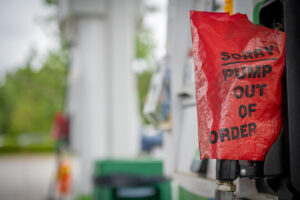Hurricanes are known for the damage they cause to buildings, communities, and economies. One thing that is often overlooked is the disruption of fuel supplies, which can impact transportation and logistics. For owner-operators, fuel shortages provide a challenge. Without access to fuel, deliveries come to a halt, incomes drop, and the ripple effect can be felt across many industries that rely on the transportation of goods.

How Hurricanes Effect Fuel Supplies
Fuel shortages are common after hurricanes, especially when they strike areas with an oil refining infrastructure. Hurricanes can cause damage to pipelines, refineries, and transportation networks, all of which can affect fuel distribution.
Refinery Shutdowns and Damage
After a hurricane, refineries are often forced to shut down either precautionary or because of storm damage. For example, hurricanes that hit the Gulf of Mexico, where a significant portion of the United State’s oil refining is located, can temporarily stop production and affect the fuel nationwide. Even minor damage to these areas can delay average fuel production for days or weeks.
Fuel Transportation Disruption
The disruption of transportation can worsen fuel damage. Damaged ports, flooded roads, and power outages make it hard to transport fuel to the refineries to some distribution centers. This then creates a bottleneck effect in the fuel supply chain, causing shortages not only in the hurricane-affected areas but also in other regions.
Increased Demand and Panic Buying
Even when fuel is available, panic buying often occurs leading up to a hurricane and during the aftermath. People begin rushing to the pumps to stock up on gas, which causes an increase in demand and reduces supplies quickly. Panic buying worsens fuel shortages, leaving important service providers like truck drivers in a bind.
The Impact of Fuel Shortages on Owner-Operators
For owner-operators, fuel is the lifeline to their business. Without it, they cannot operate, and even with short-term fuel shortages, this can have long-lasting consequences for this business.
Increased Operation Costs
When fuel becomes limited, prices often rise. Owner-operators who already operate on low margins feel the financial burden immediately. The cost per gallon of diesel can increase during a shortage, meaning that even if fuel is available, it is much more to purchase. This can result in reduced take-home pay or a complete stop in operation until fuel prices stabilize.
Delivery Delays and Missed Deadlines
Without a reliable source of fuel, owner-operators face missing deliveries. Owner-operator contracts are built around timely deliveries, and missing these can damage client relationships. In retail and food supply chains, these delays can lead to additional penalties or loss of a future business opportunity.
Reduced Freight Opportunities
As fuel shortages cause transportation issues, fewer loads may be available for owner-operators. When companies cannot secure fuel to transport goods, they often reduce their shipments, leaving truck drivers with fewer load opportunities. The fewer freight opportunities can cause a loss of income, especially for those who rely on a steady stream of short-haul deliveries.
Adapting to Fuel Shortages
While fuel shortages cause challenges for owner-operators, there are some strategies to keep their business running during tough times. Preparation, resourcefulness, and flexibility are important during these disruptions.
Fuel Management
One way to combat fuel shortages is through fuel management. Owner-operators should plan their routes carefully to make sure they are efficient with the available fuel. This could mean taking shorter, alternative routes to avoid areas with a high fuel demand or focusing on local deliveries that require less fuel.
Use Fuel Technologies
Fuel technology can help reduce the impact of the fuel shortage by maximizing how far you can go on a single tank. You can invest in fuel-efficient tires, aerodynamic enhancements, or upgrade to a new, more fuel-efficient truck. While these investments can cost more upfront, they can help lessen the long-term effects of fuel shortages by reducing fuel consumption.
Fuel shortages after hurricanes cause challenges for owner-operators, affecting operational costs and delivery schedules. Planning ahead, optimizing fuel use, and remaining flexible, you can weather these storms and continue trucking down the road. As hurricanes are more frequent and severe, having strategies in place to navigate fuel shortages is important for maintaining business relations and ensuring that goods continue to reach their destinations.

